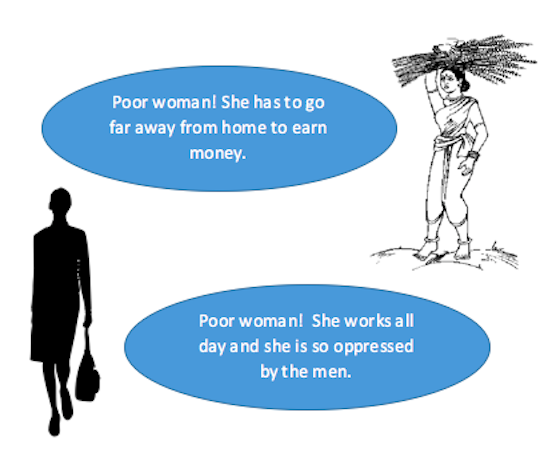In this infinite mysterious magical interconnected multi universe, my existence is on planet earth as Mira Savara. I hold a PhD, was previously with BBC World Service Trust, and am now an independent freelance consultant with the non-profit social research centre Shakti.
No… Don’t stop reading, I am making a point.
The introduction tells you that I see myself as part of my environment.
An opposing view is that I am the centre, an individual atomised self. I control my own life.
This as an example of how life is literally perceived differently. Different women, especially women from a different culture, have a different conception of a good life.
Research evaluation has tended to see the individual as the centre. I argue that research and evaluation need to expand the view. Because how one sees oneself, the view we have of life, gives meaning to different things.
Lessons Learned: I was once asked to design a massive women’s empowerment programme amongst a family based economic system. “Why?” I asked.
“The women are very oppressed by patriarchy, men, and they don’t want to change,” said the tired bureaucrat.
Interesting. He knows the politically correct word, the big P, I thought. “And why are you interested?”
“You see,” he tells me, “this international organisation has given us millions of dollars for expansion. But they say that it has to go through women-only cooperatives. And the women don’t want to join. The organisation says we have to empower the women so that they see that they are oppressed, and agree for only women cooperatives.”
Sounds familiar? So what’s wrong?
Should I be telling other women that I know better than them what is better for them?
When we do feminist evaluation we need to question how the project has been conceptualised and whether there is not an imposition of a view of the world. Would that create and maintain unequal relationships between civilizations, favouring the more powerful civilization?
Feminist imperialism?
Cool Trick: Do not presume that the viewpoint you have of the world is one that everyone yearns for. Look at the world you represent from the others eyes.

It’s a tricky tightrope, difficult situation… I hope that raising this will lead to a practical oriented debate through the work we do to develop a more holistic non imperialist perspective.
Rad Resources
I found the argument made by Saba Mahmood in “Politics of Piety: The Islamic Revival and the Feminist Subject” interesting. It shows the perspectives of women who are not seen as “feminist” in the way usually defined.
Experiments discussed by Nisbet in Geography of Thought… How Asians and Westerners Think Differently and Why? explore how experimentally the views and the very world differs.
The American Evaluation Association is celebrating Feminist Issues in Evaluation (FIE) TIG Week with our colleagues in the FIE Topical Interest Group. The contributions all this week to aea365 come from our FIE TIG members. Do you have questions, concerns, kudos, or content to extend this aea365 contribution? Please add them in the comments section for this post on the aea365 webpage so that we may enrich our community of practice. Would you like to submit an aea365 Tip? Please send a note of interest to aea365@eval.org. aea365 is sponsored by the American Evaluation Association and provides a Tip-a-Day by and for evaluators.

I really enjoyed this poignant post, because you bring up talking points that I struggle to convey effectively! Thank you for helping me find a way to open up these very important conversations!!!